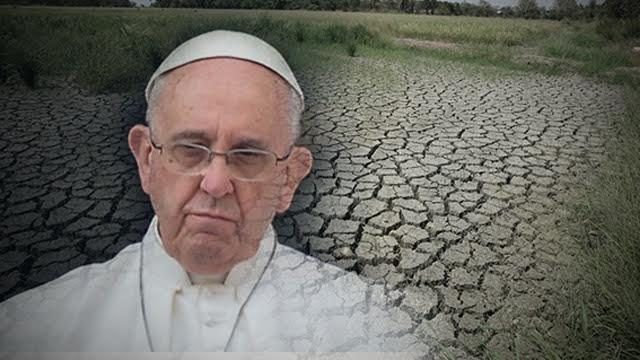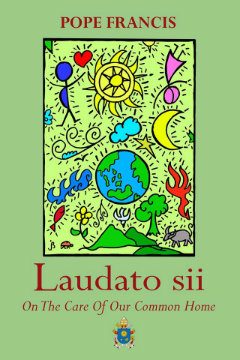SUMMARY
This is AI generated summarization, which may have errors. For context, always refer to the full article.

The encyclical of Pope Francis on the Environment, released on June 18, 2015 with the title ‘Laudato Si’, (with a subtitle: ‘on the care of our common home’), is but an affirmation of the Catholic Church’s concern for the environment. The title is a quote from a popular prayer of St. Francis of Assisi entitled Canticle of Creatures, it is translated as “Be Praised” or “Praised Be.” (READ: IN QUOTES: What Pope Francis says about climate change)
The theological locus of the Catholic Church concern for the environment is always ‘faith seeking relevance’ – along the veins of the social encyclicals and of Vatican II reforms. It is a faith rooted in the events of the lives of the people, not the Church built as a structure, but a Church alive in the hearts of the people. As lived and integrated in the life and mission of the Church, care for creation is a given praxis in monasteries, mission areas and churches. Along the theological lines, we heard of creation theology; that seeks to articulate the dynamics of doing eco-theology in church life. Likewise, there are bishops, priests, religious and laypeople who are actively involved in campaigns and often offered their lives for the protection of the environment.
Certainly, we owe St. John Paul II for his call for ecological action; emphasizing that the ecological crisis is a moral problem, he said: “We cannot interfere in one area of the ecosystem without paying due attention both to the consequences of such interference in other areas and to the well-being of future generations… While in some cases the damage already done may well be irreversible, in many other cases it can still be halted. It is necessary, however, that the entire human community – individuals, States and international bodies – take seriously the responsibility that is theirs…” (Pope John Paul II, Peace with God the Creator, Peace with all of Creation, Message for the Celebration of the World Day Of Peace, January 1, 1990).
This message was delivered ahead of the 1990 Rio Summit. The Pope then speaks of Environmental Sustainability, rooted in the concern for the future generations and a responsibility of the entire human community. From then on, this message echoed in the dioceses and parishes, pastors and lay leaders setting up “ecological desk” as a way to actively address environmental issues.
For Pope Emeritus Benedict XVI “The Church has a responsibility towards creation, and she considers it her duty to exercise that responsibility in public life, in order to protect earth, water and air as gifts of God the Creator meant for everyone, and above all to save mankind from the danger of self-destruction.” (Pope Benedict XVI, Caritas in Veritate, no. 51, Rome, June 29, 2009). He gave a grounding of the Church ecological responsibility; his legacy is on the aspect of providing the social & theological principle of environmental stewardship: “the indivisible relationship between God, human beings and the whole of creation.” I will not be surprised if this will be quoted by Pope Francis in the upcoming encyclical.
We also saw the eventual proclamation of bishops’ conferences all over the world; for purpose of brevity, I will just mention two, from the Catholic Bishops Conference of the Philippines (CBCP) and the United States Conference of Catholic Bishops (USCCB). This assessment: ‘our country is in peril. All the living systems on land and in the seas around us are being ruthlessly exploited’ moved the Philippine bishops (as early as 1988) to issue a pastoral letter entitled “What is Happening to our Beautiful Land?” – we quote an excerpt from the concluding message “We reap what we sow; the results of our attitude and activities are predictable and deadly. Our small farmers tell us that their fields are less productive and are becoming sterile. Our fishermen are finding it increasingly difficult to catch fish. Our lands, forests and rivers cry out that they are being eroded, denuded and polluted. As bishops we have tried to listen and respond to their cry. There is an urgency about this issue which calls for widespread education and immediate action.” (Catholic Bishops Conference of the Philippines, What is Happening to our Beautiful Land?, A Pastoral Letter on Ecology, January 29, 1988).
It is equally important to cite the clarion call of the United States Conference of Catholic Bishops: “The environmental crisis of our own day constitutes an exceptional call to conversion. As individuals, as institutions, as a people, we need a change of heart to save the planet for our children and generations yet unborn. So vast are the problems, so intertwined with our economy and way of life, that nothing but a wholehearted and ever more profound turning to God, the Maker of Heaven and Earth, will allow us to carry out our responsibilities as faithful stewards of God’s creation.” (Renewing the Earth: An Invitation to Reflection and Action on Environment in Light of Catholic Social Teaching, A Pastoral Statement of the United States Catholic Conference, November 14, 1991). Indeed, we echo the concerns of the bishops across boundaries, the demand for immediate action and the call to conversion – to address the ecological crisis.
Climate reality
The earth is the visible expression of creation, the visible expression of our ecological stewardship; which we are continuously destroying every minute. The earth is our common home. Expectedly, Pope Francis will define the integral connection between ecology and economy, these cannot be viewed as opposites, but rather interrelated; both etymology is rooted in the Greek word oikos – meaning home.
In a homily during the Inauguration of his Pontificate, he clearly outlines his ecological vision, when he said: “I would like to ask all those who have positions of responsibility in economic, political and social life, and all men and women of goodwill: let us be “protectors” of creation, protectors of God’s plan inscribed in nature, protectors of one another and of the environment. Let us not allow omens of destruction and death to accompany the advance of this world!” (Pope Francis, Mass for the Inauguration of the Pontificate, 19 March 2013). It is from here that he already saw damaging impact on the environment, describing it as destruction and death. He saw the reality of the changing climate.
From then on Pope Francis spoke about the unimaginable ‘climate reality’ – as to how climate change has affected the lives of the poor living in the vulnerable disaster areas. “Climate change, the loss of biodiversity, deforestation are already showing their devastating effects in terrible cataclysms which we see and from which you the humble suffer most – you who live near the coast in precarious dwellings, or so economically vulnerable that you lose everything due to a natural disaster. Brothers and sisters, creation is not a possession that we can dispose of as we wish; much less is it the property of some, of only a few. Creation is a gift, it is a present, it is a marvelous gift given to us by God so that we might care for it and use it, always gratefully and always respectfully, for the benefit of everyone.” (Pope Francis, Address To The Participants In The World Meeting Of Popular Movements, Old Synod Hall, October 28, 2014).
In a message address to the President of the 20th Conference of the Parties to the United Nations Framework Convention on Climate Change, “The consequences of environmental changes, which are already being dramatically felt in many countries, especially the insular states of the Pacific, remind us of the gravity of neglect and inaction. The time to find global solutions is running out. We can find appropriate solutions only if we act together and in agreement. There is therefore a clear, definitive and urgent ethical imperative to act.”(Pope Francis, Message on the Occasion of the 20th Conference of the Parties to the United Nations Framework Convention on Climate Change, Vatican, 27 November 2014).
Pope Francis felt the climate crisis as real and factual in his lifetime, just within his pontificate he saw the devastation of lives, properties and the displacement of millions caused by Typhoon Haiyan in the Philippines, Cyclone Pam in Vanuatu and the recent Nepal Earthquake; consistently he offered special prayers for the victims in his Angelus, and even encouraged and mobilized the Church aid agencies to give support.
For a definitive approach of finding a solution to the climate crisis, Pope Francis said: “An effective fight against global warming will be possible only through a responsible collective action, which overcomes particular interests and behaviours and develops unfettered by political and economic pressures. A collective response which is also capable of overcoming mistrust and of fostering a culture of solidarity, of encounter and of dialogue; capable of demonstrating responsibility to protect the planet and the human family.” (Pope Francis, Message on the Occasion of the 20th Conference of the Parties to the United Nations Framework Convention on Climate Change, Vatican, 27 November 2014). He re-emphasized too the call of his predecessors that the climate crisis “is a serious ethical and moral responsibility” (Message to the UN Convention on Climate Change).

Expected actions
In an interview with Rome Reports, Fr. Michael Anthony Perry, OFM , Minister General of the Order of Friars Minor said: “The Pope himself brought up the issue of the environment. And he talked about his deep concern that we need, the Church needs, to find the way to respond, using the best of science. But also using the best of goodwill of all of humanity, to bring together a consensus on trying to respond to the crisis, the ecological crisis.”
Expected and predicted themes of the due to be released encyclical can be the following: Community of Creation, Integral Ecology: Human & Environmental Ecology, Care for Creation, Climate Change or Climate Crisis, Culture of Waste, Impact of Ecological Destruction on the Poor, Call to Build a Culture of Solidarity and Encounter, Call for a Collective Ecological Action, etc.
There could be themes that Pope Francis will include beyond expectations, like: the demand to protect the lives of indigenous communities (who by themselves are inherent protectors of the Earth); the role and integration of science and faith to address climate change; a call to action to harness the use of renewable sources of energy; and lastly, an immediate action for the Church (from the bishops to the lay faithful) to be actively involved in environmental issues (and not to be silent about all the issues).
The release of the encyclical will embolden not only Catholics (and other faiths) but also environmental advocates desirous to continue doing and fighting for ‘climate justice.” It will also coincide with the United Nations’ Framework Convention on Climate Change – 21st Conference of the Parties (COP21) meeting in Paris by the end of this year; It is the hope of many that this encyclical will create ripples of hope and influence on the conference and world leaders, to be able to achieve a binding and universal agreement on climate.
“Praised be You my Lord with all Your creatures,
especially Sir Brother Sun,
Who is the day through whom You give us light.
And he is beautiful and radiant with great splendour,
Of You Most High, he bears the likeness.
Praised be You, my Lord, through Sister Moon and the stars,
In the heavens you have made them bright, precious and fair.
Praised be You, my Lord, through Brothers Wind and Air,
And fair and stormy, all weather’s moods,
by which You cherish all that You have made.
Praised be You my Lord through Sister Water,
So useful, humble, precious and pure.
Praised be You my Lord through Brother Fire,
through whom You light the night and he is beautiful and playful and robust and strong.
Praised be You my Lord through our Sister,
Mother Earth
who sustains and governs us,
producing varied fruits with coloured flowers and herbs.”
– St. Francis of Assisi, Canticle of Creatures
– Rappler.com
Br. Jaazeal ‘Tagoy’ Jakosalem, OAR, is a visual artist and sustainability educator. He studied philosophy, finished his theology in 1999, and has been active with the Climate Reality Project, a global climate movement founded by Nobel Laureate and former US Vice President Al Gore.
Add a comment
How does this make you feel?





There are no comments yet. Add your comment to start the conversation.